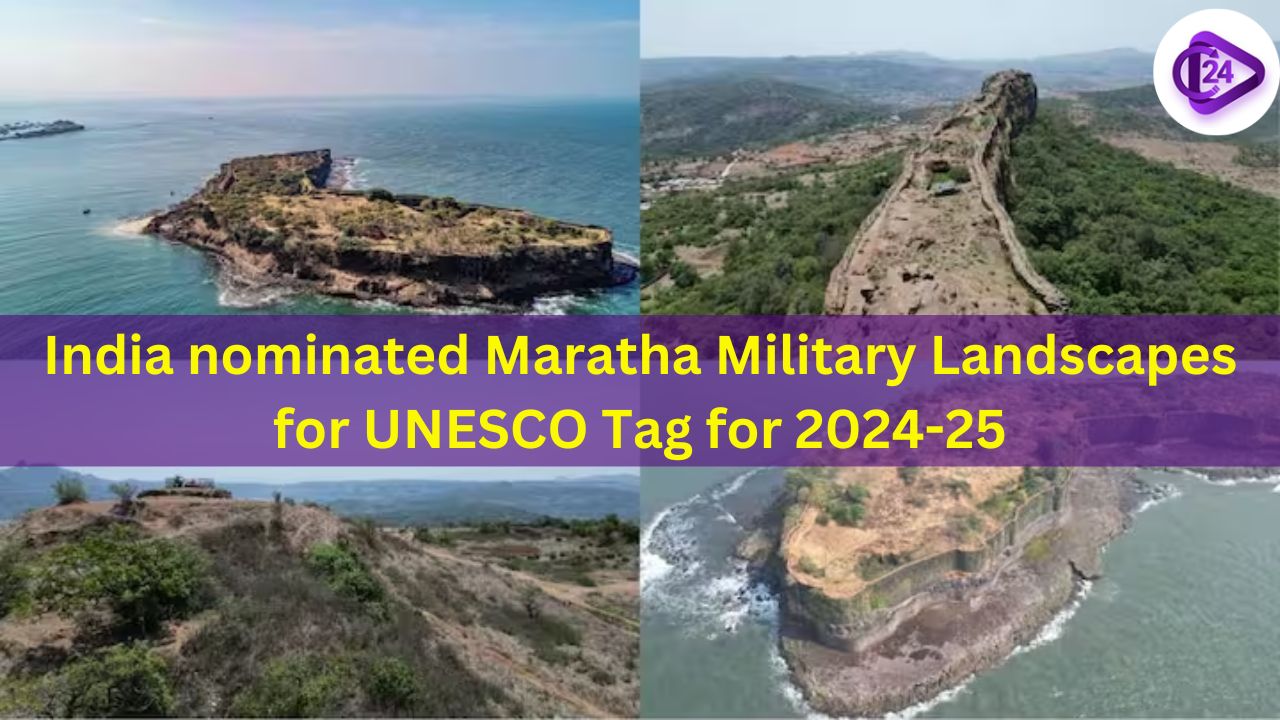India nominated Maratha Military Landscapes for UNESCO Tag for 2024-25

Recently, the Ministry of Culture informed that the 'Maratha Military Landscapes' has been nominated for UNESCO Tag for 2024-25. This landscape represents the extraordinary fortification and military system envisioned by the Maratha rulers. The twelve components have been nominated under the 'Maratha Military Landscapes', out of which eleven are located in Maharashtra and one is located in Tamil Nadu. Here are the complete details about Maratha Military Landscapes.
Maratha Military Landscapes: Components
-
The Maratha Military Landscapes has been divided into twelve components, of which eleven are nestled in Maharashtra and one is located in Tamil Nadu.
-
The twelve components are as follows:
-
Maharashtra: (1) Salher Fort, (2) Shivneri Fort, (3) Lohgad, (4) Khanderi Fort, (5) Raigad, (6) Rajgad, (7) Pratapgad, (8) Suvarnadurg, (9) Panhala Fort, (10) Vijay Durg, and (11) Sindhudurg
-
Tamil Nadu: Gingee Fort
-
Maratha Military Landscapes: History
The inception of the Maratha Military ideology dates back to the 17th Century during the reign of the Maratha King Chhatrapati Shivaji Maharaj by 1670 CE and continued through subsequent rules until Peshwa rule till 1818 CE.
Maratha Military Landscapes: Development
-
The Maratha Military Landscapes of India were developed between the 17th and 19th centuries.
-
It has represented an extraordinary fortification and military system envisioned by the Maratha rulers.
Maratha Military Landscapes: Physiographic characteristics
These selected 12 landscapes have been distributed across the Sahyadri mountain ranges, the Konkan Coast, the Deccan Plateau, and the Eastern Ghats in the Indian Peninsula.
Maratha Military Landscapes: Types of Forts
-
These 12 nominated Maratha military forts are hill forts, hill-forest forts, hill-plateau forts, coastal forts, and island forts.
-
Hill forts: Salher fort, Shivneri fort, Lohgad, Raigad, Rajgad, and Gingee fort
-
Hill-forest fort: Pratapgad Fort
-
Hill-plateau fort: Panhala Fort
-
Coastal Fort: Vijaydurg Fort
-
Island Forts: Khanderi fort, Suvarnadurg and Sindhudurg
-
Maratha Military Landscapes: Protected by the ASI
-
In Maharashtra, there are more than 390 forts, out of which only 12 forts are selected under the Maratha Military Landscapes of India, and only eight forts are protected by the Archaeological Survey of India (ASI).
-
Shivneri Fort, Lohgad, Raigad, Suvarnadurg, Panhala Fort, Vijaydurg, Sindhudurg, and Gingee Fort are protected by the ASI.
-
Whereas Salher Fort, Rajgad, Khanderi Fort, and Pratapgarh are protected by the Directorate of Archaeology and Museums, Government of Maharashtra.
World Heritage Sites: Maharashtra
-
Presently, India has 42 World Heritage sites, out of which 34 are cultural sites, seven are natural sites and one is a mixed site.
-
While Maharashtra has six World Heritage Sites out of which, five are cultural and one natural
-
World Heritage Sites of Maharashtra:
-
Cultural sites: Ajanta Caves (1983), Ellora Caves (1983), Elephanta Caves (1987), Chhatrapati Shivaji Maharaj Terminus (formerly Victoria Terminus) (2004), Victorian Gothic and Art Deco Ensembles of Mumbai (2018)
-
Natural sites: Western Ghats of Maharashtra, Karnataka, Tamil Nadu and Kerala (2012)
-
FAQs:
1. How many sites have been selected under Maratha Military Landscapes, which will be nominated for the UNESCO tag for 2024-25?
Ans: 12 sites have been selected under Maratha Military Landscapes, which will be nominated for the UNESCO tag for 2024-25.
2. Name the site, which will be nominated for the UNESCO tag for 2024-25 by India?
Ans: Maratha Military Landscapes
3. What is the Physiographic characteristics of Maratha Military Landscapes?
Ans: The selected 12 landscapes under Maratha Military Landscapes have been distributed across the Sahyadri mountain ranges, the Konkan Coast, the Deccan Plateau, and the Eastern Ghats in the Indian Peninsula.
4. What is type of Maratha Military Landscapes?
Ans: The12 nominated Maratha military forts are hill forts, hill-forest forts, hill-plateau forts, coastal forts, and island forts.





